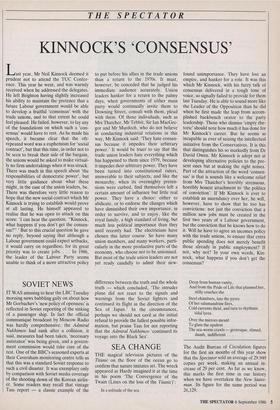THE SPECTATOR
KINNOCK'S 'CONSENSUS' L
ast year, Mr Neil Kinnock deemed it prudent not to attend the TUC Confer- ence. This year he went, and was warmly received when he addressed the delegates. He left Brighton having slightly increased his ability to maintain the pretence that a future Labour government would be able to develop a fruitful 'consensus' with the trade unions, and to that extent he could feel pleased. He failed, however, to lay any of the foundations on which such a 'con- sensus' would have to rest. As he made his speech, it became clear that the oft- repeated word was a euphemism for 'social contract', but that this time, in order not to be seen to break their side of the bargain, the unions would be asked to make virtual- ly no firm undertakings when it was struck. There was much in this speech about 'the responsibilities of democratic power', but very little guidance about what these might, in the case of the union leaders, be. There was therefore very little reason to hope that the new social contract which Mr Kinnock is trying to establish would prove at all lasting. He himself appeared to realise that he was open to attack on this score: 'I can hear the question, "Kinnock, what happens if you don't get the consen- sus?" ' But to this crucial question he gave no reply, beyond saying that although a Labour government could expect setbacks, it would carry on regardless, for its great priority was to create jobs. . . In 1986, the leader of the Labour Party seems unable to think of a more attractive policy
to put before his allies in the trade unions than a return to the 1970s. It must, however, be conceded that he judged his immediate audience accurately. Union leaders hanker for a return to the palmy days, when governments of either main party would continually invite them to Downing Street, consult with them, plead with them. Of those individuals, such as Mrs Thatcher, Mr Tebbit, Sir Ian MacGre- gor and Mr Murdoch, who do not believe in conducting industrial relations in this way, Mr Kinnock said: 'They hate consen- sus because it impedes their arbitrary power.' It would be truer to say that the trade union leaders hate everything which has happened to them since 1979, because it impedes their arbitrary power. They have been turned into constitutional rulers, answerable to their subjects, and like the monarchy, when its overmighty preten- sions were curbed, find themselves left a certain amount of influence but little real power. They have a choice: either to abdicate, or to endorse the changes which have diminished their own importance, in order to survive, and to enjoy, like the royal family, a high standard of living, but much less political importance than they until recently had. The electricians have chosen this latter course. So have many union members, and many workers, parti- cularly in the more productive parts of the economy, who choose not to be unionised. But most of the trade union leaders are not yet ready candidly to admit their new-
found unimportance. They have lost an empire, and hanker for a role. It was this which Mr Kinnock, with his fuzzy talk of consensus delivered in a tough tone of voice, so signally failed to provide for them last Tuesday. He is able to sound more like the Leader of the Opposition than he did when he first made the leap from accom- plished backbench orator to the party leadership. Those who dismiss 'empty rhe- toric' should note how much it has done for Mr Kinnock's career. But he seems as incapable as ever of seizing the intellectual initiative from the Conservatives. It is this that distinguishes his so markedly from Dr David Owen. Mr Kinnock is adept not at developing alternative policies to the pre- sent ones but at making the right noises. Part of the attraction of the word 'consen- sus' is that is sounds like a welcome relief from Mrs Thatcher's horribly strenuous, horribly honest attachment to 'the politics of conviction'. If Mr Kinnock is ever to establish an ascendancy over her, he will, however, have to show that he too has convictions: not just the conviction that a million new jobs must be created in the first two years of a Labour government, but the conviction that he knows how to do it. Will he have to agree an incomes policy with the trade unions, to ensure that extra public spending does not merely benefit those already in public employment? If not, why not? In your own words, Kin- nock, what happens if you don't get the consensus?






































 Previous page
Previous page